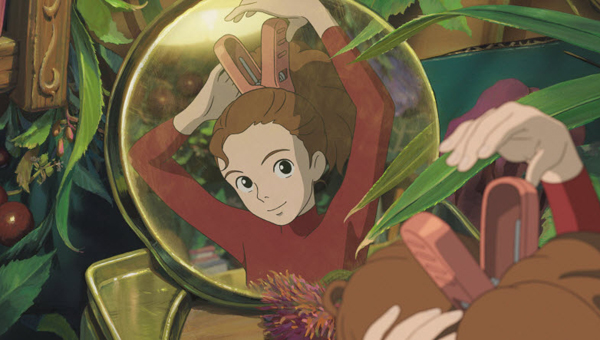Arrietty Review

Animated films tend to attract children in droves. They grab a reluctant parent by the wrist before running to the cinema as fast as a teenage boy shedding his clothes in grateful anticipation of his first sexual encounter. Once they’ve sat down, these little people then throw popcorn at each other, shout, talk and generally make a ruckus for most of the film before climaxing in a good long sleep.
Knowing this, I entered the screening for Arrietty with some trepidation. The noise level seemed about right, with lots of yelling and screaming going on. But when I looked around, I realised one annoying child was the sole cause of this. Thankfully, Studio Ghibli’s reputation seems to have attracted an audience just a little longer in the tooth.
Arrietty follows a family of “little people”, small human-like creatures living within the world of “big people”; trying their best to avoid contact with these giants while also borrowing from them in order to survive.
The daily life of a little person is an epic affair, where normal fixtures and fittings of an average home are transformed into Everest sized obstacles. Throw in the risk of getting stepped on by “bigger people”, and it’ll make you think twice about popping out to borrow a sugar cube.
Arrietty is also the name of the film’s fourteen year old protagonist, whose curiosity about the human house she lives in leads her to explore this. Inevitably, Arrietty ends up face to face with the “bigger people’s” teenage son and they begin a friendship.
When this turns sour, it forces the little family to move somewhere else; and further away from the bigger people.
Hayao Miyazaki, director and animator for Arrietty, has adapted Mary Norton’s classic novel “The Borrowers” for Studio Ghibli’s latest cinematic release. As anyone familiar with previous Ghibli films might expect, the animation in Arrietty is beautiful. It flows and holds your attention, and reminds me of the Japanese cartoons I watched throughout my childhood.
Arrietty is aimed at children, so has a more ‘cutesy’ feel than Ghibli’s most famous films Spirited Away and Princess Mononoke. It still has the impressive production values of these previous films, but is let down by a highly irritating score. French harpist Cecile Corbel has produced the sonic equivalent of pink fluffy candy floss, with her music tasting as though it had been dipped in sugar.
Half way through Arrietty, the screen went black and everything stopped as we weren’t watching the appropriate version. So I ended up watching the first half in Japanese with English subtitles and the second half in dubbed English.
I can understand how the dubbed edition is more suitable for small children, but as an adult, I’d much rather see the original as it feels more authentic. Not all verbal communication is literal.
Despite this, I stuck it out to witness the film’s ridiculous moral conclusion. Having not read the original book, I can’t say if this has been tacked on or not. But these types of forced, americanised climaxes are both unnecessary and highly annoying.
Without wanting to give away the ending, the moral finger wagging conclusion makes me want to the polar opposite of what I’ve just been lectured is the right way to live.
Of course I’m not going to do that, so I settled on slapping the now sleeping child awake instead.
Marie Eve Linck